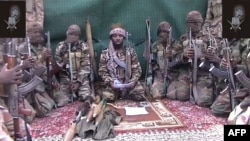YAOUNDE —
There is growing concern in Cameroon that the Nigerian extremist group Boko Haram is infiltrating villages along the border. The arrest of 18 suspected members of the group has sparked wide criticism that the army is focused only on northern part of the country, and is ignoring other parts of Cameroon's long, winding border with Nigeria.
Inhabitants of Sabongari, a small Cameroonian village that borders Nigeria's Taraba state, told VOA that they have been seeing strange faces in their village in the past two weeks. The sightings began when Cameroon deployed troops to the north to patrol against Boko Haram.
Schoolteacher Nfor John said their local vigilante group arrested some people pretending to be food merchants and handed them to local authorities.
"People were caught moving down from this part of the country, transporting food stuff with some munitions. I mean, this is enough sign to make the government sit up. These are very dangerous signs for the authorities," said John.
Witnesses began reporting possible Boko Haram activity in northern Cameroon last year, as Nigeria's military launched an offensive aimed at crushing the Islamist militant group.
Tawe Cletus, a trader at Abongshe, another village on the border with Taraba, said the porousness of the border and the departure of the military to North Cameroon has exposed them to Boko Haram.
"There are other parts of the country that share a common border with Nigeria which the government is letting loose. And if Boko Haram sees that the government is paying attention to a particular region, they can infiltrate. The enemy who does not want you to identify him, of course, will use any means to infiltrate," Cletus stated.
Ngalla Elvis, who lives in the village of Loor, said local residents are scared the government has left them unprotected. "We are afraid. Ndonga Mantung people are afraid of Boko Haram. Cameroon government is supposed to be more pre-emptive and proactive than being reactive. They are deploying 3,000 soldiers to the north where Boko Haram has indicated its presence and forgetting about the other borders where Boko Haram has not yet signaled. I am talking about physical presence of military officers with ammunition that can actually demonstrate to the Boko Haram people that we are present," said Elvis.
Government official Ayeni Derek was dispatched by Cameroon's government to reassure citizens, told VOA that measures are being taken to protect the villages. He said the government is also reminding people to help by pointing out any suspicious activity.
"They move around the churches to sensitize [educate] the population to know that they are the first to give information for government to use to counteract what the Boko Haram is doing. Put it up to the administration that I am seeing this strange face and then the administration is going to take the necessary steps," said Derek.
Preventing infiltration by Boko Haram will be a difficult task. Cameroon shares a boundary of close to 1,800 kilometers with Nigeria, and less than 50 percent of it is currently being guarded by armed forces.
Inhabitants of Sabongari, a small Cameroonian village that borders Nigeria's Taraba state, told VOA that they have been seeing strange faces in their village in the past two weeks. The sightings began when Cameroon deployed troops to the north to patrol against Boko Haram.
Schoolteacher Nfor John said their local vigilante group arrested some people pretending to be food merchants and handed them to local authorities.
"People were caught moving down from this part of the country, transporting food stuff with some munitions. I mean, this is enough sign to make the government sit up. These are very dangerous signs for the authorities," said John.
Witnesses began reporting possible Boko Haram activity in northern Cameroon last year, as Nigeria's military launched an offensive aimed at crushing the Islamist militant group.
Tawe Cletus, a trader at Abongshe, another village on the border with Taraba, said the porousness of the border and the departure of the military to North Cameroon has exposed them to Boko Haram.
"There are other parts of the country that share a common border with Nigeria which the government is letting loose. And if Boko Haram sees that the government is paying attention to a particular region, they can infiltrate. The enemy who does not want you to identify him, of course, will use any means to infiltrate," Cletus stated.
Ngalla Elvis, who lives in the village of Loor, said local residents are scared the government has left them unprotected. "We are afraid. Ndonga Mantung people are afraid of Boko Haram. Cameroon government is supposed to be more pre-emptive and proactive than being reactive. They are deploying 3,000 soldiers to the north where Boko Haram has indicated its presence and forgetting about the other borders where Boko Haram has not yet signaled. I am talking about physical presence of military officers with ammunition that can actually demonstrate to the Boko Haram people that we are present," said Elvis.
Government official Ayeni Derek was dispatched by Cameroon's government to reassure citizens, told VOA that measures are being taken to protect the villages. He said the government is also reminding people to help by pointing out any suspicious activity.
"They move around the churches to sensitize [educate] the population to know that they are the first to give information for government to use to counteract what the Boko Haram is doing. Put it up to the administration that I am seeing this strange face and then the administration is going to take the necessary steps," said Derek.
Preventing infiltration by Boko Haram will be a difficult task. Cameroon shares a boundary of close to 1,800 kilometers with Nigeria, and less than 50 percent of it is currently being guarded by armed forces.











